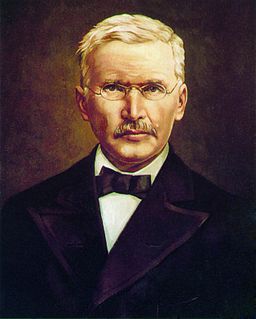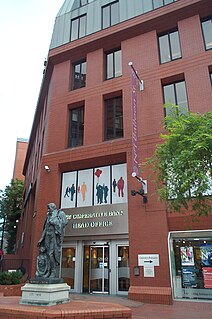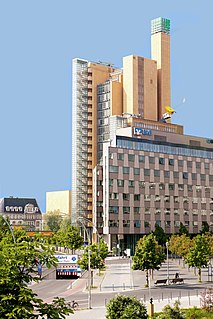FinanzVerbund
The Bundesverband der Deutschen Volksbanken und Raiffeisenbanken (Federal Association of German 'Volksbanken und Raiffeisenbanken' Cooperative Banks) has introduced the "FinanzVerbund" (translated by the association as "Cooperative Financial Services Network") or Finanzverbund Volksbanken Raiffeisenbanken combining a number of subsidiaries.
Note how some financial institutes use variants of the Volksbanken und Raiffeisenbanken brand, its abbreviation "VR" or the older brand "R+V" (spoken as "R and V" referring to Raiffeisen and Volksbank). The scheme of a corporate identity and a franchise market where a brand and product structure is licensed is a modern invention that came about long after most cooperatives were founded, so many financial institutes continue with their historic name. Nevertheless, most of the cooperative financial institutes have changed to the blue-orange color of the Volksbanken und Raiffeisenbanken brand (only Schwäbisch-Hall continues with its traditional red-yellow logo).
The 'Volksbanken und Raiffeisenbanken' group in Germany is not associated with the 'Volksbank' institutes (people's bank) in other countries, like the Volksbank group headquartered in Austria. Likewise 'Raiffeisen' is more generic than banks and it is often used in other cooperation types in the farming industry, see Deutscher Genossenschafts- und Raiffeisenverband.

Friedrich Wilhelm Raiffeisen was a German mayor and cooperative pioneer. Several credit union systems and cooperative banks have been named after Raiffeisen, who pioneered rural credit unions.

DZ Bank AG is the second largest bank in Germany by asset size and the central institution for more than 900 cooperative banks and their 12,000 branch offices. Within the Volksbanken Raiffeisenbanken Cooperative financial network, which is one of Germany's largest private sector financial service organizations, DZ Bank functions both as a central institution and as a corporate and investment bank.

Cooperative banking is retail and commercial banking organized on a cooperative basis. Cooperative banking institutions take deposits and lend money in most parts of the world.
The Deutsche Genossenschafts- und Raiffeisenverband e.V. (DGRV) is the Co-operative federation for German Co-operatives.
People's Bank, or variations such as People's State Bank or People's National Bank Building, may refer to a number of banks or bank buildings:

There are several European banks that operate under the name "Volksbank".
Co-operative Bank or Cooperative Bank may refer to:

Banking in Germany is a highly leveraged industry, as its average leverage ratio as of 11 October 2008 is 52 to 1 ; its short-term liabilities are equal to 60% of the German GDP or 167% of its national debt.
Raiffeisen Bankengruppe is the larger of two groups of cooperative banks in Austria.

Union Investment is the investment arm of the DZ Bank Group and part of the cooperative financial services network. It was founded in 1956 and is headquartered in Frankfurt.

The National Association of German Cooperative Banks (BVR) is the umbrella association for the cooperative banking sector in Germany. As of 2015 it had 1,021 members, which represents all the cooperative banks in Germany, including local cooperative banks, PSD banks, Sparda banks, Church banks and Cooperative financial institutions. The cooperative banking sector in Germany has a balance sheet of 1,081 billion Euros and employs around 191,000 members of staff.
VBU Volksbank im Unterland eG is a cooperative German bank situated in Schwaigern, Baden-Wuerttemberg. The bank is a member of the Bundesverband der Deutschen Volksbanken und Raiffeisenbanken as well as of the Baden-Wuerttembergischer Genossenschaftsverband.
Raiffeisenbank refers to cooperative banks in Europe that are rooted in the early credit unions of Friedrich Wilhelm Raiffeisen. The name is found in:
TakarékBank is a banking and financial services corporation in Hungary and it is the central institution for more than 60 co-operative banks and their 1,100 branch offices. TakarékBank consolidates its co-operative banks and forms the Takarék Group, which is the fourth largest bank in Hungary by AUM of 1,889 billion Hungarian forint.
The Edekabank AG is a universal bank and a business of the Edeka Group located at the Edeka House, New-York-Ring 6 in the City Nord in Hamburg. The bank is the central financing institute of the Edeka grocery retailers and is active in consumer banking as direct bank with online and phone consulting.
The PSD Bank München which has its headquarters in Augsburg, Germany, is a regional operating direct bank for private customers, who are part of the PSD Banking Group. The bank is a member of the Bundesverband der Deutschen Volksbanken und Raiffeisenbanken (BVR), together with 13 other independent PSD banks. Its business area expands across Swabia, Upper Bavaria and Lower Bavaria, where the bank serves about 85,000 private customers. The PSD is among Munichs biggest cooperative banks, with total assets of over 2 billion Euro. Its legal supervision is carried out by the Federal Financial Supervisory Authority.
Bausparkasse Schwäbisch Hall AG is a building society in Germany, active abroad with subsidiaries in Eastern Europe and China. It has more than 10 million customers. Shareholders are the cooperative central bank DZ Bank in Frankfurt am Main and around 600 cooperative banks. The building society has its headquarters in the city of Schwäbisch Hall in Baden-Württemberg.
The Südwestbank AG is a regional bank in the southwest of Germany which is located in Stuttgart. The bank operates in the form of a stock corporation and looks after about 100,000 private and corporate customers in Baden-Württemberg.
The Volksbank Neckartal eG is a German cooperative bank headquartered in Eberbach.
This page is based on this
Wikipedia article Text is available under the
CC BY-SA 4.0 license; additional terms may apply.
Images, videos and audio are available under their respective licenses.







